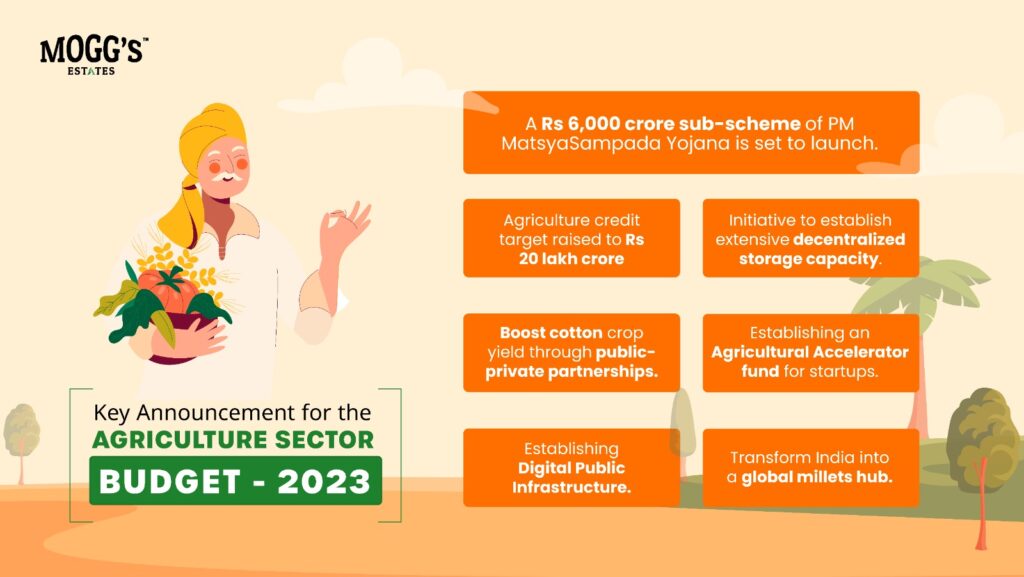Agriculture is the Backbone of the Indian Economy contributing 53.89% GVA of India.
Taking into account how agriculture either directly or indirectly affects our daily lives and the nation’s economic expansion. It’s more crucial than ever to concentrate on agriculture businesses because they:
- frequently present cutting-edge techniques and technology that can improve farming’s sustainability, productivity, and efficiency.
- introduce new crops, farming methods, and agribusiness models to diversify agriculture and create a more varied and resilient agricultural environment.
- may boost economic development in rural areas by encouraging entrepreneurship, generating job opportunities, and boosting general economic growth.
- can boost agricultural production, cut waste, and strengthen the resilience of food supply systems to help increase food security.
- emphasize ecologically responsible and sustainable farming methods in order to mitigate environmental issues and advance farming’s long-term viability.
- can give small-scale farmers improved market access, enabling them to reach a larger clientele and get reasonable pricing for their produce.
- may reduce inefficiencies and ensure a more dependable and timely delivery of agricultural products by streamlining and modernizing the agricultural supply chain.
- can offer farmers insightful information that will help them manage their resources and make better decisions.
- can boost the agriculture industry’s ability to compete globally by encouraging innovations that follow global norms and guidelines.
The primary goal of agricultural startups is to inspire young people to return to their roots and elevate the standard of the agriculture industry with the aid of their innovative ideas, skills, and fresh enthusiasm.
The Indian government has taken steps to support agricultural startups through an agricultural accelerator fund in an effort to promote the various advantages that these companies can offer India in the coming years.
Before delving deeply into the latest developments in the agricultural sector brought about by the Agriculture Accelerator Fund, let’s examine what the fund is, why it was introduced, and some associated terminology you should be aware of.
What is an Agriculture Accelerator Fund?
An Agriculture Accelerator Fund is like a special fund that helps new and growing agricultural businesses. It gives them money, advice, and connections to grow quickly. This fund is managed by different groups that focus on supporting agriculture. The main aim is to encourage new ideas in farming, promote eco-friendly practices, and solve problems in food production and technology.
Purpose Of Agriculture Accelerator Fund
An agricultural accelerator fund’s mission is to promote sustainability, innovation, and growth in the agriculture industry. In order to address obstacles and seize possibilities in the agricultural sector, these funds often act as a financial and support vehicle for agricultural entrepreneurs and businesses. The following are some of an agricultural accelerator fund’s main goals:
Encourage Innovation: The goal of accelerator funding is to find and encourage creative concepts, methods, and technology in the agricultural industry. This could involve developments in agtech, sustainable practices, precision farming, and other areas.
Encourage Entrepreneurship: These funds give agricultural startups and entrepreneurs financial support to help them develop their ideas into successful businesses. Accelerator funds help fledgling businesses in the agriculture sector expand by providing tools, cash, and coaching.
Promote Growth: The goal of agricultural accelerator funds is to hasten the expansion of innovative agricultural enterprises. In addition to funding these startups, they also offer networking opportunities, mentorship, and strategic advice to help them grow faster.
Address Sector Challenges: Changing customer tastes, resource restrictions, and climate change are just a few of the issues facing the agriculture sector. The goal of accelerator funds is to provide assistance for solutions that tackle these issues and improve agriculture’s resilience, sustainability, and ability to meet market demands.
Promote Technology Adoption: As a result of technological advancements, agricultural accelerator funds frequently assist initiatives that use cutting-edge technologies to boost productivity, sustainability, and efficiency in farming operations.
Create a Robust Environment: Funds from accelerators help to establish a strong environment for agricultural innovation. These grants assist in creating a network that encourages cooperation and knowledge sharing by putting entrepreneurs in touch with mentors, business leaders, and possible partners.
Boost Global Food Security: These grants indirectly improve global food security by funding agricultural technologies. Technology developments, sustainable practices, and increased efficiency can improve food production and distribution networks.
Key Terms Related To Agriculture Accelerator Fund
Accelerator Program: A short-term, teamwork-focused program helping agricultural startups grow faster through mentorship, learning, and networking.
Agtech (Agricultural Technology): Special technology created for farming to make it more efficient, productive, and sustainable. Agtech startups often get support from funds that help agricultural businesses grow.
Precision Agriculture: Using technology like GPS, sensors, and data analysis to make farming better by improving crop yield, using resources wisely, and making everything more efficient.
Sustainable Agriculture: Farming practices that try to have the least impact on the environment, save resources, and stay strong over a long time. Accelerator funds may give more attention to startups focused on sustainable farming.
Proof of Concept (POC): Showing that a new idea in farming is possible and can work. Startups looking for support from agricultural accelerator funds might need to prove that their innovations can succeed.
Cohort: A group of startups that join and go through an accelerator program together. Cohorts learn from each other, work together, and support one another.
Demo Day: The final event of an accelerator program where startups show their products or services to possible investors, experts, and the public.
Mentorship: Getting advice and guidance from experienced people (mentors) during the accelerator program, helping startups handle challenges and make smart decisions.
Pitch Deck: A presentation showing the key points of a startup’s business, like what it does, the market it’s in, the team, and future financial plans. Startups use pitch decks when asking for support from accelerator funds.
Exit Strategy: A plan for how investors in a startup will get their money back. This might include selling the startup, going public, or other ways to turn their investment into cash.
Farm-to-Fork: An approach that looks at the entire process of making and selling food, from growing it on the farm to people eating it. Accelerator funds might help startups at different stages in this process.
Value Chain: The complete journey of making, distributing, and selling farm products, covering everything from the farm to the consumer.
Agricultural Budget 2023
The Department of Agriculture and Farmers Welfare is running a program called “Innovation and Agri-Entrepreneurship Development” from 2018-19. The goal is to encourage new ideas and businesses in agriculture by offering financial support and creating an environment for startup growth. They’ve partnered with five Knowledge Partners and appointed twenty-four Agribusiness Incubators across the country to help startups.
This program provides financial aid to entrepreneurs in agriculture. At the idea stage, they get Rs. 5.00 lakh, and at the seed stage, they receive Rs. 25 lakhs. So far, 1138 agri startups have been supported with a total of Rs. 70.30 crores. The support includes both money and guidance to help startups launch their products and services in the market, and to help them grow and become successful businesses.
Finance Minister Nirmala Sitharaman’s Budget 2023 speech brought significant announcements for the agricult

ure sector, focusing on agri startups, increased agricultural credit allocation, and digital infrastructure.
Agricultural Credit Boost: The agriculture credit target for the fiscal year 2023-24 has been raised by 11 percent to Rs 20 lakh crore. This increased focus includes support for animal husbandry, dairy, and fisheries.
Digital Public Infrastructure: The government plans to establish digital public infrastructure for agriculture, aiming to provide inclusive and farmer-centric solutions through relevant information services.
Addressing Credit Disparities: Currently, around 30 percent of farmers have access to institutional credit, while the remaining 70 percent rely on informal credit sources with high-interest rates. Efforts are underway to bridge this gap.
Storage Capacity Enhancement: To tackle the lack of storage capacity, the finance minister announced plans to set up massive, decentralized storage. This initiative is expected to assist farmers in storing and selling their produce at the right times, reducing wastage.
PM Matsya Sampada Yojana: A new sub-scheme, the PM Matsya Sampada Yojana, will be launched with a targeted investment of Rs 6,000 crore. This scheme aims to support fishermen, fish vendors, and MSMEs in the fisheries sector.
Computerization of PACS: The government has initiated the computerization of 63,000 Primary Agricultural Credit Societies (PACS) with an investment of Rs 2,516 crore. This move is likely to streamline financial processes for farmers.
These measures indicate a comprehensive approach to strengthen the agriculture sector, encompassing credit accessibility, digital advancements, storage solutions, and targeted support for specific segments like fisheries. The goal is to enhance the overall efficiency, productivity, and inclusivity of the agricultural ecosystem.
Conclusion
In India, the agricultural sector accounts for 18% of GDP. The goal of Indian agricultural startups has been to modernize and enhance the nation’s traditional agricultural industry, which has led to their tremendous popularity in recent years. The startups, which are a part of the third-largest startup environment in the world in India, have sparked a nationwide movement among consumers looking for real farm-to-fork goods that are delivered quickly and digitally from producer to consumer. The agricultural industry in India would continue to flourish if more agri-startups like these were empowered with the aid of these funding. These agri-startups would be important in revolutionizing the traditional agricultural sector and providing farmers with greater income.




